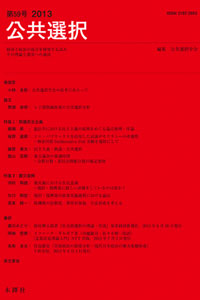2013 巻, 59 号
選択された号の論文の14件中1~14を表示しています
- |<
- <
- 1
- >
- >|
編集委員会
-
2013 年2013 巻59 号 p. 0
発行日: 2013年
公開日: 2020/05/03
PDF形式でダウンロード (93K)
巻頭言
-
2013 年2013 巻59 号 p. 1-2
発行日: 2013年
公開日: 2020/05/03
PDF形式でダウンロード (150K)
論文
-
2013 年2013 巻59 号 p. 5-25
発行日: 2013年
公開日: 2020/05/03
PDF形式でダウンロード (992K)
特集Ⅰ:熟議民主主義
-
2013 年2013 巻59 号 p. 26-47
発行日: 2013年
公開日: 2020/05/03
PDF形式でダウンロード (338K) -
2013 年2013 巻59 号 p. 48-65
発行日: 2013年
公開日: 2020/05/03
PDF形式でダウンロード (388K) -
2013 年2013 巻59 号 p. 66-85
発行日: 2013年
公開日: 2020/05/03
PDF形式でダウンロード (316K) -
2013 年2013 巻59 号 p. 86-109
発行日: 2013年
公開日: 2020/05/03
PDF形式でダウンロード (589K)
特集Ⅱ:震災復興
-
2013 年2013 巻59 号 p. 110-125
発行日: 2013年
公開日: 2020/05/03
PDF形式でダウンロード (774K) -
2013 年2013 巻59 号 p. 126-142
発行日: 2013年
公開日: 2020/05/03
PDF形式でダウンロード (399K) -
2013 年2013 巻59 号 p. 143-161
発行日: 2013年
公開日: 2020/05/03
PDF形式でダウンロード (413K)
書評
-
2013 年2013 巻59 号 p. 162-164
発行日: 2013年
公開日: 2020/05/03
PDF形式でダウンロード (175K) -
2013 年2013 巻59 号 p. 165-167
発行日: 2013年
公開日: 2020/05/03
PDF形式でダウンロード (160K) -
2013 年2013 巻59 号 p. 168-170
発行日: 2013年
公開日: 2020/05/03
PDF形式でダウンロード (170K)
編集後記
-
2013 年2013 巻59 号 p. 177
発行日: 2013年
公開日: 2020/05/03
PDF形式でダウンロード (144K)
- |<
- <
- 1
- >
- >|
